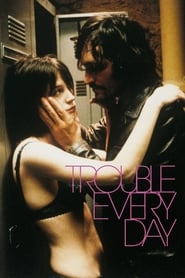Oh yeah, I probably shouldn't have watched one of the most infamous scenes from the New French Extremity while seated next to an old lady on a Picadilly Line train. Sorry…
This extended conversation between Jason Bellamy and Ed Howard in Slant is essential reading, as is Adam Nayman's appearance on Michael & Us (episode 446).
I do not see in Trouble Every Day anything like a “demonic possession,” which would imply an external, non-human force supplanting human responsibility. I think that idea would be uninteresting to Denis, who’s always been drawn to human actions and their repercussions: Beau travail [is] all about guilt, betrayal and the weight of the past, just as Trouble Every Day is about infidelity and lust. This film is more in the tradition of “mad science” horror fiction like Dr. Jekyll and Mr. Hyde and its many descendants: the horror arises because science has unleashed the terrible impulses already latent within humanity. Mr. Hyde is terrifying because his existence suggests that he was present within the kindly Dr. Jekyll all along. […] Denis is subverting the conventional thinking about the closeup, the idea that such intimacy with the camera allows the audience to get closer to a character.
— Ed Howard (Slant)
I don’t look at Coré and Shane as portals to our dormant demons. I see nothing that reflects my own soul. What I do see in Trouble Every Day is a chilling portrait of addiction. Coré and Shane aren’t addicted to the drug that made them want blood but to the blood itself. Same difference. Now infected, they want to do nothing but “use.” […] Furthermore, any feminist reading is on slippery ground. Yes, Coré is a sexy archetype, an exaggeration of the unapproachable woman who is both appealing and intimidating to men. But while Coré is a sexual predator, thus taking on the role usually assigned to men, she is also—much more than Shane—reduced to her sexual urges. […] It is, of course, a movie about cannibals, and yet as incomplete as any encapsulation would be without that word, that’s the word that’s most misleading. It is bloody and disturbing but, for me, not horror. Trouble Every Day defies any neat categorization. That alone doesn’t make it great, but it’s part of the allure. It would be easy now to fall back on that old cliché that “it’s not for everyone,” but if Trouble Every Day isn’t for everyone, who is it for? If it wasn’t a struggle to watch, it wouldn’t be so interesting to behold.
— Jason Bellamy (Slant)

